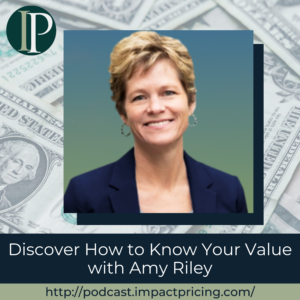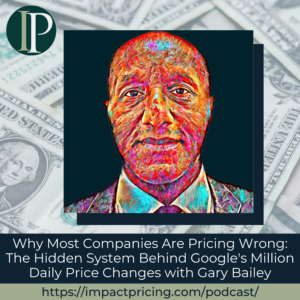Amy L. Riley is an internationally renowned speaker, author and leadership development consultant. She’s worked with organizations such as Deloitte, Cisco Systems and Aon Hewitt and has over 20 years of experience working with leaders at all levels.
In this episode, Amy shares effective ways of identifying your strengths, finding solutions to people’s problems, and quantifying the results of your solutions. By doing so, you can accurately assess your ability to bring about transformation for your clients and determine your true worth.
Podcast: Play in new window | Download
Why you have to check out today’s podcast:
- Learn to know your strength and what value you bring so you know your worth
- Discover the benefits of receiving feedback to identify areas for improvement and areas to maintain to enhance your leadership skills
- Find out how to develop people skills so you become a more effective leader
“Encourage leaders to get feedback all the time.”
– Amy Riley
Topics Covered:
00:57 – What Amy is helping people with
02:09 – The value you bring–what’s your worth?
04:22 – Best means to identify your strengths
06:49 – How does feedback benefit you as a leader and how to deal with self-delusion?
09:49 – Figure out your leadership legacy
10:52 – Fighting to be right versus fighting to be effective
11:49 – The thing with leaders admitting their mistakes
12:43 – What is a pivot and why pivot?
13:35 – The easy ways to find out where your strengths lie
14:50 – How to develop effective people skills
17:42 – Why the need to be open to feedback
20:00 – Amy sharing what her strengths and what problems she helps solve
24:22 -The potential outcome and its financial value that can be attained with Amy’s expertise
Key Takeaways:
“The value that we bring is inherent in our strengths.” – Amy Riley
“When we’re looking to that leadership legacy for guidance, then we act bigger and bolder than any of our normal human considerations that might hold us back.” – Amy Riley
“If you do find yourself in those moments where you’re fighting to be right instead of fighting to be effective, do give yourself some compassion, because we’re human beings, and that’s a human tendency.” – Amy Riley
Resources/People Mentioned:
- The Courage of a Leader®: How to Inspire, Engage and Get Extraordinary Results by Amy Riley: https://courageofaleader.com/products/
Connect with Amy Riley:
- Website: https://courageofaleader.com/
- LinkedIn: https://www.linkedin.com/in/amyshoopriley/
Connect with Mark Stiving:
- LinkedIn: https://www.linkedin.com/in/stiving/
- Email: [email protected]
Full Interview Transcript
(Note: This transcript was created with an AI transcription service. Please forgive any transcription or grammatical errors. We probably sounded better in real life.)
Amy Riley
Encourage leaders to get feedback all the time.
[Intro]
Mark Stiving
Welcome to Impact Pricing, the podcast where we discuss pricing, value, and the inherent relationship between them. I’m Mark Stiving, and our guest today is Amy Riley. And here are three things you want to know about Amy before we start. She’s been running Shoop Consulting Group for 20 years, so I guess that means it’s successful . She has a forthcoming book called The Courage of a Leader, and I find it fascinating that she is, or at least was a pregnancy coach. Welcome Amy.
Amy Riley
Thank you, Mark. I’m glad to be here.
Mark Stiving
Okay. Just for the listeners benefit, we tried this a week ago and we had so many technical problems, so today is going to go perfectly, but there may be some inside jokes. We’ll try not to tell them as we go through .
Amy Riley
Take two, everyone.
Mark Stiving
Take two. So, how did you get into pricing? We know you’re not really in pricing, but how did you get into pricing?
Amy Riley
I love that you are having me on your Impact Pricing podcast, Mark, and we do believe that there is a tie. No, I would not say that I am in pricing, but I am in the business of leadership development and encouraging every leader to understand the unique value that they bring to their work, to their teams, to their relationships, to every interaction. So I’m about helping leaders distinguish what is their leadership legacy, or the purpose of their leadership.
Mark Stiving
So I love that. I have to tell you that several years ago in my mind, I almost wrote a book called The Value of You, but I know I wrote a couple of podcasts or blogs about the Value of You. Yeah. And it’s like, well, how do you know your own value? Because we think about the value of products all the time. But each one of us as an individual, and we sell our time, we sell our soul to somebody and so what’s it worth? What’s the value of that?
Amy Riley
Yes. And there can be something slightly tricky here because the value that we bring is inherent in our strengths. And sometimes where we are innately strong, we don’t recognize it, Mark, because we just show up and we think in that organized way, right? Or we’re able to streamline something, or we’re able to connect the knots and bring people together in a way. And we do that naturally. So I’ve worked with so many leaders who don’t recognize how much value they bring because they’re so readily able to provide that value. So I tell them specifically to look at where you are strong, right? You know, it’s a strength of yours. People come to you for that because you’re good at it. And then where are you interested? Where do you have that passion? Right? And I know, Mark, the value you bring is around pricing, and you’re great at it, and you’ve been passionate about it, for a long, long time.
Mark Stiving
So what I love about what you just said is that when I work with solopreneurs, this becomes so obvious because solopreneurs undervalue themselves dramatically. And I think I never thought about why other than a self-confidence problem, but I think what you just said resonates a lot in that we only have one mind. And so we think we’re like everybody else. And the fact that I can do something so easily, everybody else can do this so easily. And that isn’t necessarily a true statement. And so now the question becomes, how do we tease out what we’re great at? And, so I mentioned solopreneurs because I work with them and I know a lot of them, and I see the lack of self-confidence they often have. But the exact same thing is true with people who are working in companies because this is just you and your own mind. So how do we help people figure out what these strengths are and help them realize that everybody isn’t like that?
Amy Riley
Yes. So I encourage folks to reflect, right? Reflect every day on what felt natural. Where did you feel like you were in the groove? Where did you feel like things were clicking? Where did time pass by quickly, right? You got engaged in that task and all of a sudden you come up from it and 90 minutes have gone by and you didn’t realize. That’s probably an indication that you’re working in a strength area where you provide particular value. So reflecting on where you feel strong, and then let’s also make some notes about where we produce great results, right? So in that team meeting, there was discontent. There was tension, right? And you were able to facilitate a conversation that allowed people to share their views, find their common ground, and get aligned on some aspects of the work. Make note of that, right? Hey I created value there. When your team or you puts out a deliverable, right? What kind of value are you creating? We’ve talked, Mark about like, what problem are you solving at that moment and what is that worth to the people around you and to your organization? So just kind of open up a document or an Evernote or a piece of paper and a journal and make those notes along the way, and then you begin to see that pattern.
Mark Stiving
Yeah. What I find fascinating is, as you speak, I think about how almost everything you say applies directly to products as well. And so products and people are so similar.
Amy Riley
We think about this tie. Yeah.
Mark Stiving
Yeah. So, we think about those results, we think about those problems that we’re solving, and that’s exactly how I teach people to figure out what’s the value of a product, right? So what’s the problem you’re solving? What’s the result that someone’s going to expect? And then turn that into profit or dollars to the company.
Amy Riley
Yeah.
Mark Stiving
So I think people could do this the exact same way with one huge exception. And that is self-honesty. I know when I was younger, I would lie to myself all the time. How do you teach someone not to do that?
Amy Riley
Yes. I encourage leaders to get feedback all the time. And there’s of course, different ways that we can do this. I’m certified in some 360 degree feedback assessments where there can be a formal process. I’m also leading a leadership development program right now where we just encourage everybody at the beginning of the program, talk to five to seven people. How am I doing with my leadership? Where could I be doing better? Right? What do you like, what do you wish that I could shift? And have those real conversations and open up that dialogue. And with the leaders in this program, with all leaders we don’t want feedback conversations to be one and done, oh, I got this information, now I know what to work on. And once I’ve worked on that, it’s all set. But keep that dialogue going in the vein of continuous improvement because lots of things that we do as leaders, communicating, interacting, inspiring, engaging, those are things that we can always be working on because when we work with people and people are different, it’s nuanced. Yeah. And we’re forever adapting.
Mark Stiving
So I go back to self-delusional Mark, if I may. Okay. Because I love making fun of my old self. It’s just easy. But self-delusional, Mark would’ve listened to feedback and anybody who said something good, they are brilliant. And anybody who said something bad, talk about stupid people. I mean, why would I ever listen to that person?
Amy Riley
Yes. And the question is, how do you get someone not to be delusional?
Mark Stiving
Okay. Yeah. Is there a trick? I’m not even sure how I got out of that mode, but I actually, I can give you a guess as to how I got out of it, but do you have a trick?
Amy Riley
I mean, Mark, I’m lucky in the work that I do, that for the vast majority of leaders that I’m working with, they care and they want to do better. Actually, that would be the access point, right? What’s important to you? What are your values? What do you want to achieve with your leadership in your work, in your career? And then beginning to tie that developmental feedback to what is important to that person. Because if that commitment is big enough, then they’ll open their hearts and minds to the enhancements, the opportunities for improvement.
Mark Stiving
Yeah. I think that makes sense. And one of the things I learned in my career along the way is that if I put the goal above everything else, then everything else starts to become easier. Right. I don’t have to internalize the bad feedback. It’s, oh, okay. Got it. You said this, but it may be true. It may not be true. Does that help us get to our goal?
Amy Riley
Is it in service of this bigger picture commitment? Oh, exactly. I love that you said that, Mark, because I work with leaders to distinguish their leadership legacy. What is the bigger picture, purpose, and commitment of your leadership? And when we’re looking to that leadership legacy for guidance, then we act bigger and bolder than any of our normal human considerations that might hold us back. That when there’s that commitment, it can really pull us forward.
Mark Stiving
Yeah. And then if I can add one more. I remember a mentor taught me this, and when he said it to me, it was like, oh my gosh, that is so true. And I’ve said this to so many people I’ve coached ever since then. And that is, do you want to be right or effective? And there’s such a huge difference, right? I can fight to be right, but what I really want to do is make sure we hit the goal, whatever that happens to be.
Amy Riley
Yes. And of course, yeah. I love that. And of course, it’s human nature, right? So folks out there, if you do find yourself in those moments where you’re fighting to be right instead of fighting to be effective, do give yourself some compassion, because we’re human beings, and that’s a human tendency, especially when we care, right? We care, we’ve been working for something, we’ve been advocating for X, we see how it can go this way, right? And then there’s divergent views or something else comes up. Yeah. And we got to regroup and think about, all right, how do we be effective in this moment rather than stay the course with that idea I knew was right at one point.
Mark Stiving
I think that’s the point. And I never even thought about the one I’m about to tell you, and I’ve never written it down, but it follows on with that one. And that is, I think the world changed when I realized it was okay to be wrong.
Amy Riley
Ah, yes. Yes. I’ve seen so many leaders that are afraid to admit they made a mistake, they were wrong. We’re going to need to change our tactics and our path forward. And I got to tell you, every team member I’ve ever talked to, we really, really respect those leaders that say, hey, oops, you know, I messed up. We thought this was the way to go. We’ve got new information, now, we’re going to go in another direction. Or, oops, I messed up. Like I missed that thing. I’m sorry I let you all down with that. We really respect that.
Mark Stiving
And if you think about it, one of the positive words we hear about companies all the time is we made a pivot. Yeah. So what does a pivot actually mean?
Amy Riley
You’re saying that might be fancy speak for.
Mark Stiving
I was wrong.
Amy Riley
Might have made an error and now we are changing our ways.
Mark Stiving
Exactly.
Amy Riley
Even our world is dynamic and changing, and we’re learning, right? And we make the best decisions that we can based on the information that we have. And it might cause us to need to pivot when we get the next round of information.
Mark Stiving
That’s exactly right. Okay. So last time we were on, we had our tech problems. You made a suggestion, which I internalized and loved, but you haven’t said it yet today. Oh, so you’re going to say that now, right? That is, I tell you , I want to know the easy trick for people to learn where their strengths are. And what you said to me, well, do you want to try to guess what you said? Or do you want me to tell you what you said?
Amy Riley
Tell me what I said.
Mark Stiving
What you said was, what do people ask you to do?
Amy Riley
Yeah. What do others come to you for? Right. Where did they get you involved?
Mark Stiving
Yes.
Amy Riley
Right, because they subconsciously or consciously know you’re great at it.
Mark Stiving
And they know they’re going to get you the answer. You’re going to solve the problem. There’s something going on there. And so if we pay attention to when people come to ask us things, it helps us understand when, what we do well, what other people rely on us for.
Amy Riley
Yep. Exactly.
Mark Stiving
Okay. Got it. So now this is supposed to be a pricing podcast. So let’s talk about pricing people for a second. I am a typical pricing person, was a typical pricing person, very technically, logically oriented, not super social, not super people-oriented. How do we learn to become more people oriented? Because I feel like that’s important to becoming a great leader.
Amy Riley
Yes. Well, so one is knowing your strengths, right? Are your strengths people-oriented? If your strengths are not people-oriented, you can surround yourself with people who are people oriented, right? And can role model that and you can learn. I suggest a lot of self-reflection, right? Where was that a positive interaction? I mean, lots of times you could say by coming back to that commitment Mark, like, I’ve got this commitment. In the bigger picture, are we moving towards that commitment? Because often if we’re shooting for something big, then we need to work through and with other people. And are we able to make progress? If not ask, right? Ask people what’s working, what’s not working? What do you want me to keep doing? What do you want me to do differently? I also have folks talk about, again, there’s different assessments that you can do like DISC or Myers-Briggs to understand your preferences and your natural tendencies for communicating, for interacting, for approaching problems or work situations.
Or you can just have a conversation. Just have a conversation amongst your team and find out from your team leaders and from your other leader colleagues, how do you like to communicate? Are you a big picture talker? Do you like to get into the details? Right? Do you like to have some chit chat before we get down to work, right? That’s often something for the folks who are self-proclaimed, not good at people skills, right? They go straight to talking about the business. You might have some folks that get rubbed a little bit the wrong way by that. They want to have some connection, they want to have some chit chat about the weekend first. Looks like you’re going to say something, Mark.
Mark Stiving
Do you remember when we started the podcast today? I said, we got on the phone and I said, are you ready? Let’s hit record.
Amy Riley
You did? Yes.
Mark Stiving
The thing that that keeps jumping out at me from everything you say is being open to feedback, right? Yeah. I think if we can open ourselves up to listening to people and so I’ve gotten myself in this mode and maybe this is right, maybe this is wrong, I don’t know, but I listen to everybody’s feedback and then I step back and I say, I get to choose if that was right or wrong. Yes, I get to choose if I want to do something about that or not do something about that. But I don’t just dismiss it without listening to it first.
Amy Riley
Yes. We do want to be authentically open to it. Often in the conversation. If we give ourselves permission to just hear it and understand it to the best of our ability and know that we’ll consider it later and decide whether we’re going to implement any changes or not, that can help us be more present in the conversation and really get what the other person is saying, and then yeah, authentically look at it and maybe they don’t see some of the interactions that you have, right? And they don’t get to see the behavior that they’re talking about. Maybe you decide, uh, that’s really not quite aligned with my brand and who I am and what I’m about. Yet no, it is someone’s perception. Oh, and Mark, sometimes when folks get feedback, we talk about the difference between do I have a skill question here, or do I have a PR question here?
Because sometimes we have the skill and we’re demonstrating it, but there’s a misunderstanding about why we’re doing it or how we’re doing it. Or sometimes they don’t have exposure to our full work days, especially now when so many people are working virtually or hybrid, right? They don’t, they don’t see or hear the conversations where I am advocating for my team or whatever the thing is, right? So sometimes you need to communicate, share more overtly about what you’re doing, about what you’re working on. So sometimes it’s, yeah, a perception or a PR issue I’ve called it. And sometimes like, okay, there is a skill to develop or to practice.
Mark Stiving
Yep. And so it turns out that when we sell products, it’s always about the customer’s perception of value.
Amy Riley
There we go.
Mark Stiving
And so when we’re playing the role of a leader, it’s always about the people around us and their perception of what we’re doing and what our value is. Yeah. Okay. Speaking of value, besides entertaining podcast hosts, when you talk to them, what are your strengths?
Amy Riley
My strengths are, facilitating, coaching, meeting people where they’re at. So when you said, let’s dive right in, my preference would be let’s chat for a few more minutes, but I’m like, all right, great. I’m going to meet Mark where he is at.
Mark Stiving
Let’s go do it.
Amy Riley
Let’s dive in.
Mark Stiving
Yeah. I try to do that, but I’m not very good at it.
Amy Riley
Well, there’s some places where folks are easier, they’re able more easily to adapt to the other style, right? And then there’s some places where you might find me more rigid.
Mark Stiving
Okay. I want to sell your value here. Okay? And so how do we do that? We say, what are your strengths? And your strengths are your features. We’ll put it that way. Yeah. And so what problems do your features solve? So when I think of your strengths, what problems are you solving for people?
Amy Riley
Yes. So the strengths of facilitating, coaching, speaking, whew. And you can help me fine tune this Mark. I have leaders that come to me that are overwhelmed, too much on their plate, don’t know where to prioritize, right? Don’t know how to strategically best use the time that they have, right? And through coaching and mentoring, suggesting some things for them to react to, we work through and find practices and mindsets that work for them so that they can be more effective, more efficient.
Mark Stiving
Nice.
Amy Riley
That can show up in a variety of ways. Yeah.
Mark Stiving
I’m going to restate the problem as simply as I can, and you can tell me if this was right or not. One problem is, leaders are overwhelmed. Another problem is leaders lack confidence in knowing what they need to do next.
Amy Riley
Yep.
Mark Stiving
So these are two real problems.
Amy Riley
Yep. And then I have organizations, oh, go ahead
Mark Stiving
I was just going to say, now I come work with you, I’ve got these problems, I come to work with you, what’s the result I might expect?
Amy Riley
Yes. And this is where I think a lot of folks in my line of work struggle. Because the results can look different, but they would be able to be expressed in terms of increased influence, increased productivity. I’ve had leaders be able to estimate how much time was lost on the team due to drama or not being able to have frank feedback conversations or getting wound up in conflict that’s not healthy conflict. And giving them and their teams the skills to communicate and to have effective conflict, being able to talk about being X percent more productive and then whatever their thing is, right? Whether they bring products to market or they launch marketing campaigns, right? Being able to do more on time, more on budget, better results from their deliverables.
Mark Stiving
Nice. And so I would say if I were going to rephrase what you just said, I would say the results are, we will make your team more efficient and more effective, and we will make you more confident in what you do. Lovely.
Amy Riley
Yeah.
Mark Stiving
Right?
Amy Riley
Yeah.
Mark Stiving
And so now assuming those things are true, which I believe wholeheartedly, if we were doing my version of value and I’m trying to sell a product, how much money did we just make the company because we did that?
Amy Riley
Yeah. Right.
Mark Stiving
Obviously it depends on the role of the leader.
Amy Riley
Yeah. I mean, this really could be worth a lot. There’s a leadership program I’m involved in that is going to wrap up at the end of next month, and we will be working with them between now and then. They picked a project to apply their learnings and the frameworks and the practices that they’ve been learning throughout the program to that specific project. And we are going to have them looking at what has been the impact of that project, right? In numbers, right? So you’re changing this process or you’re introducing a new policy, or you’re developing the team to think more strategically whatever your project is, what’s going to be the result of that, and really pushing them to get to numbers. And this is the fourth year we’re doing this program. The numbers blow their executive leaders out of the water every year. It’s really fun. And I get to sit back and be so proud, right? But when you begin to think about your impact and the ripple effects of that it’s quite astonishing.
Mark Stiving
Okay? So we have a bunch of pricing people listening right now, maybe product people. But, I’ll make two things, two analogies for you. Okay? Number one, what we just talked about has everything to do with your product, right? So what’s the problem you’re solving? What’s the solution that you have? What’s the result they would expect? And then how much money are you going to make your customer when they do that? The other thing I want you to pull away is this, is this absolutely true for you and your career, right? So everything you are doing is solving problems for the customer and in this case, the customer happens to be your company. And so what are those problems? What kind of results are you achieving? And then how much money are you making the company? Yeah. And as you can quantify that, get better and better at that, then you can earn a raise, you can earn a promotion.
Amy Riley
Yeah. Keep actively writing that resume, right? And we’ve all been told in that resume, put the bottom line results that you achieved, right? Get it into numbers. Be constantly writing that. Know what you’re worth. I love it, Mark.
Mark Stiving
Yeah. Awesome. Amy, I love talking to you. This is just fun.
Amy Riley
This has been really fun for me and really valuable to have you translate my words today into bottom line pricing language. Yeah. It’s been really fun to see the ties between our worlds.
Mark Stiving
Yeah. If anybody wants to contact you, how can they do that?
Amy Riley
The website is the easiest way, courageofaleader.com, and you can find the courage of a leader on LinkedIn as well.
Mark Stiving
Nice. And when’s your book going to be out?
Amy Riley
It’s actually out.
Mark Stiving
Oh, sorry.
Amy Riley
It’s actually out. My author coach would be telling me that I should be writing a new one. But yeah, The Courage of a Leader How to Inspire, Engage, and Get Extraordinary Results is out. You can find it on Amazon and some other places. You can also find all the links on the website to the Kindle, paperback, and audio book version.
Mark Stiving
All right, everybody go read that book. And to our listeners, thank you so much for your time today. If you enjoyed this, would you please leave us a rating and a review? And finally, if you have any questions or comments about the podcast or pricing in general, feel free to email me, [email protected]. Now, go make an impact!
















